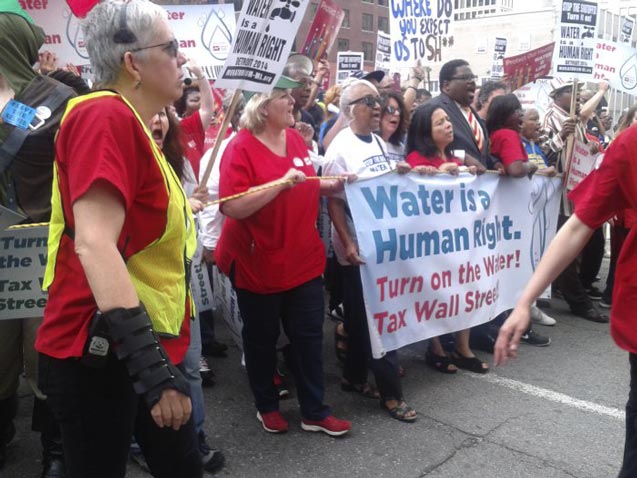
Did you know that Truthout is a nonprofit and independently funded by readers like you? If you value what we do, please support our work with a donation.
During the Super Bowl earlier this year, Chrysler unveiled the latest iteration of the “Imported From Detroit” advertising campaign that has been such a key part of their rebranding efforts in the wake of their filing for bankruptcy in 2009. The commercial starts off with a montage of your usual idealized American imagery—cowboys riding horses, cheerleaders leading cheers, sweet middle-aged waitresses bringing bacon and eggs to grizzled farmers at a Route 66 diner—accompanied by the sound of Bob Dylan’s raspy Minnesotan drawl asking us rhetorically if, “there’s anything more American than America?” a question which pretty well sets the tone for the rest of the ad considering the implied answer is a 283 horsepower “hell no!” From there the ad touches on the Motor City’s automotive pedigree and its role in making America the country it is today, with Bob telling us that,”making the best…making the finest, takes conviction.” and letting us know that, “you can’t import the heart and soul of every man and woman working on the line.” All of these laudable, yet trite, sentiments are designed to stir up our pride in our country and in the city of Detroit—to make us associate the glory of our collective past and the hard-scrabble can do aspects of our national character with the Chrysler brand—and in this respect the ads are pretty effective. The only problem is that these passionate evocations of Chrysler’s commitment to the working men and women of America and Motown bears little resemblance to reality.
You see, when Chrysler filed for Chapter 11 bankruptcy 5 years ago, the laborers that are lionized in their “Imported From Detroit” ads took the overwhelming brunt of the punitive measures that were handed out. In the wake of Chrysler’s restructuring and ultimate sale to Italian automaker Fiat, 4 factories were shut down, 789 dealerships—and an estimated 37,000 jobs – were lost, cost-of-living wage adjustments were eliminated and a two-tier wage scale was created that allows Chrysler to pay new hires half of what they pay their more experienced workers. Meanwhile, on the backs of these massive cuts and with the aid of $12.5 billion dollars in taxpayer aide – $1.3 billion of which will never be recovered– the now 100% Italian owned Fiat Chrysler Automobiles is making out like a bandit, posting a net profit of $1.6 billion in the fourth quarter of 2013 alone. As was the case with the $700 billion bank bailout in 2008 and the recent corporate thievery involved in the Patriot Coal bankruptcy case which I have covered before in great detail, the auto industry and government officials have used our nation’s legal system to burden ordinary citizens with the collateral damage from financial crises that they had nothing to do with.
 Didn’t vote for him? Doesn’t matter. Governor Snyder’s vote is the only one that counts. (Photo: Drew Gibson)One of the most instrumental players in the Chrysler bankruptcy case was Kevyn Orr, a partner at the massive law firm Jones Day who was charged with the task of bringing Chrysler back to life as expeditiously and ruthlessly as possible. Orr carved up Chrysler with surgical precision, completing the reorganization of the company within 42 days and raking in more than $1 million in legal fees during the process. As a reward for his work in the bankruptcy case, Orr was named by Michigan Governor Rick Snyder as the “Emergency Manager” of the City of Detroit in 2013, a title that is about as ominous and Orwellian as anything this side of the Department of Homeland Security. As Emergency Manager, Orr has essentially been given free reign to do with the City of Detroit as he sees fit, without any interference from pesky, democratically elected city council members and officials, who are essentially impotent during the time the city is judged to be in a Financial Emergency.
Didn’t vote for him? Doesn’t matter. Governor Snyder’s vote is the only one that counts. (Photo: Drew Gibson)One of the most instrumental players in the Chrysler bankruptcy case was Kevyn Orr, a partner at the massive law firm Jones Day who was charged with the task of bringing Chrysler back to life as expeditiously and ruthlessly as possible. Orr carved up Chrysler with surgical precision, completing the reorganization of the company within 42 days and raking in more than $1 million in legal fees during the process. As a reward for his work in the bankruptcy case, Orr was named by Michigan Governor Rick Snyder as the “Emergency Manager” of the City of Detroit in 2013, a title that is about as ominous and Orwellian as anything this side of the Department of Homeland Security. As Emergency Manager, Orr has essentially been given free reign to do with the City of Detroit as he sees fit, without any interference from pesky, democratically elected city council members and officials, who are essentially impotent during the time the city is judged to be in a Financial Emergency.
According to the Michigan legislature’s ironically titled Local Financial Stability and Choice Act—an act that was passed during a lame duck session of Michigan’s legislature and is little more than a repackaged version of another act that was repealed by Michigan voters in the 2012 elections – an Emergency Manager is essentially a de jure dictator of a local government and/or school district during a fiscal crisis. The Emergency Manager can usurp the power of all government officials, modify union contracts, alter pensions for city workers, sell off public assets and exercise complete authority over local school districts. Oh yeah, and he can also work with the Detroit Water and Sewage Department Board of Water Commissioners to shut off the water supply for residents who are behind on their payments by as little as 60 days or $150, because—according to the Emergency Manager’s stated logic—the best way to stimulate a struggling local economy is by shutting off the water supply to more 17,000 of said economy’s poorest and most vulnerable members.
The City of Detroit’s water policy, which the United Nations has termed, “a violation of the human right to water.”, is just the most recent instance of a disturbing trend in American politics to reframe problems related to globalization, corporate greed and rising income inequality on a growing class of unemployed, underpaid and overworked citizens. Emergency Manager Orr and his stable of bankruptcy lawyers have tried mightily to cast these water shutoffs as a matter of economic necessity and personal responsibility, painting themselves as honest businessmen and the citizens who can’t pay their water bills as “scofflaws” and “people gaming the system.” The only problem is that this neither of these assertions are based in truth.
As a cost saving measure, shutting off the water supply for the city’s poorest residents makes no sense. Due to recent sweeping layoffs within the Detroit Water and Sewage Department, the city was forced to mete out a $5 million contract to a private demolition company to shut off the water to about 17,000 homes which have an average outstanding water bill of only $540. If the city truly wanted to get their money back, they would’ve started hounding Joe Louis Arena, Ford Field, Palmer Park Golf Club and half of the commercial and industrial buildings in the city who owe roughly $30 million in overdue water fees. Likewise, the idea that the failure of Detroit residents to pay their water bills is simply a “choice” that they are making in an effort to avoid payment for basic services collapses under the weight of inquiry. When your city has lost 63% of its population since 1950, sports a poverty rate of 42%, has a per capita income that is less than half the national average, and has had its water rates increased by nearly 120% over the past decade with no accompanying rise in wages, any choice that is left to you is between the Scylla of unpaid utilities and the Charybdis of overdue rent and empty cupboards.
 Water is a human right. Greed is not. (Photo: Drew Gibson)
Water is a human right. Greed is not. (Photo: Drew Gibson)
No, as is so often the case in this age of corporate hegemony, the Detroit water shutoffs are principally about privatization and the potential to turn a profit on a publicly held utility. For the past few weeks, Emergency Manager Orr and his staff have been considering at least 13 separate bids from private parties who are interested in bidding for the rights to city’s water department and the recent spate of cutoffs is seen by many as an attempt from the Emergency Manager to paint the department as a profitable enterprise, which it may very well be for whatever company it is that ends up controlling it. However, case studies from all across the country and the globe have shown that the benefits of water privatization begin and end with companies doing the privatizing, with private operators proving to be no more efficient or technically sound than their public counterparts while contributing to massive rate hikes for citizens, as is the case in the UK where the price of privately controlled water has increased by 50 percent over the past two decades despite a lack of change in operating costs. Despite what Governor Snyder and Emergency Manager Orr might tell you, privatizing Detroit’s water system is not a magic bullet that will fix the city’s financial woes. In reality, it’s just your average lead and copper bullet being fired at the working class residents of Detroit so they’ll scatter and make way for the city’s gentrification.
As you may have heard, more than 1,000 protestors converged on Detroit’s Cobo Hall this past Friday to let Emergency Manager Orr and the Detroit Water and Sewage Department know what they thought of a policy that denied tens of thousands of Detroiters of their access to clean water. The rally, which was put on by National Nurses United, Robin Hood Tax USA, Moratorium-MI.Org and a host of other great progressive organizations, was a true testament to the resolve of the citizens of Detroit and their allies across the country, and presented the world with a unified face that made it clear that it would not accept a world in which water is a luxury and not a natural human right. Through the actions of these passionate activists, community leaders and citizens, along with brief remarks from actor Mark Ruffalo and Congressman John Conyers (D-MI), the rally gained international media attention and shined a none-too-flattering light on the inhumane behavior of Emergency Manager Orr and his staff. In fact, the portrayal of the Detroit Water and Sewage Department’s behavior was so damaging that, just today, the department has come out to say that they are suspending all water shut offs for the next 15 days. It is a minor victory for water rights advocates and the people of Detroit, but it is a victory nonetheless, and one which they have desperately needed after months and years of having their voices roundly ignored by the city’s corporate and political elite.
However, to appropriate an expression from the realm of drug and alcohol treatment, striving for social justice is like trying to walk up a down escalator. It’s possible to climb your way to the top, but the process is long, it is exhausting and if you stop moving for too long you end up right back at the bottom where you started. This moratorium on shut offs will mean nothing if things go back to business as usual when the 15 days are up. The enthusiasm and awareness that has been drummed up by the rally on Friday will not help the people of Detroit preserve their rights to clean water if in a month all of the major media outlets are ignoring them once again and many of the people who attended the rally—out-of-staters like myself in particular—are putting the struggle on the back burner and focusing their energies solely on other issues. This is a long an arduous process, something that many of world-weary veterans who cut their teeth during the civil rights, women’s rights and LGBT rights movements of the 60s and 70s are well aware of and that young twenty-somethings are just beginning to understand. In order to protect the water rights of Detroiters, as well as their rural brethren in the hills of Appalachia and people struggling all across this nation of ours, we have to care more about each other than the Kevyn Orr’s of the world care about money. It’s a tall order, but given the fire and willpower I saw assembled in Hart Plaza on Friday, I have no doubt that it can—and will—be done, because while Governor Snyder can import as many green-eyed lawyers as he wants to run Detroit, he can’t import the heart and soul of every man and woman marching in the picket line.
Media that fights fascism
Truthout is funded almost entirely by readers — that’s why we can speak truth to power and cut against the mainstream narrative. But independent journalists at Truthout face mounting political repression under Trump.
We rely on your support to survive McCarthyist censorship. Please make a tax-deductible one-time or monthly donation.